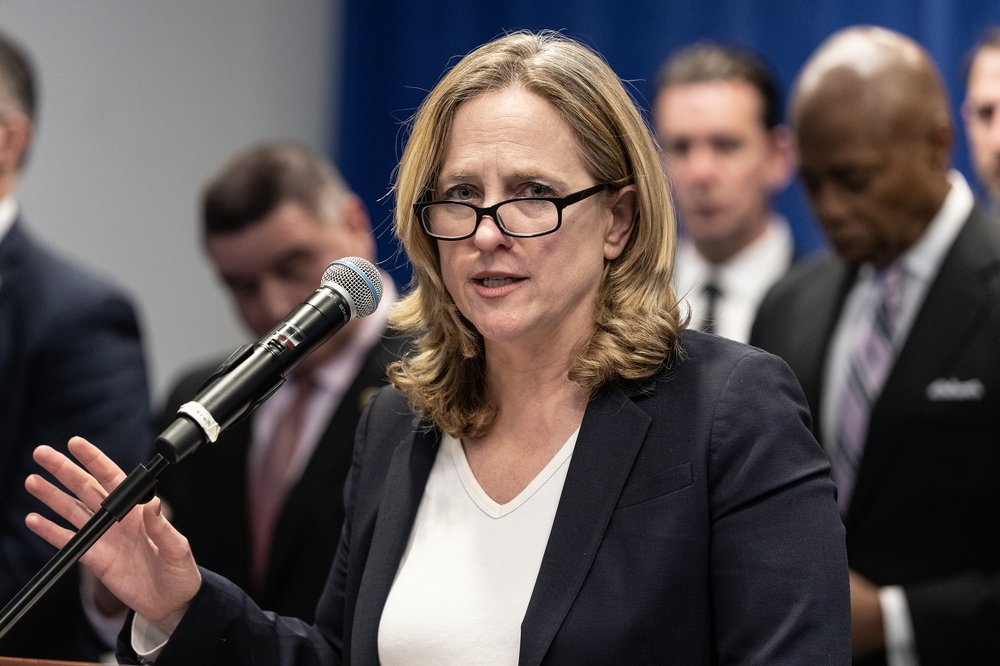Queens DA blames civil rights reforms for more than a quarter of cases being dismissed
March 2, 2025, 11 a.m.
Melinda Katz says 27% of her cases were dismissed because her lawyers couldn't meet court deadlines.

Judges in Queens dismissed more than 11,000 criminal cases last year because prosecutors missed deadlines for turning over evidence, Queens District Attorney Melinda Katz said last week, arguing new laws around sharing evidence are hampering prosecutions.
The number represents 27% of all cases her office processed last year, and Katz said it includes low-level misdemeanors that her office didn’t prioritize. The dismissals come as she and others lobby state lawmakers to roll back criminal justice reforms enacted in 2020.
Bur defense lawyers say the problems cited by Katz are unique to New York City and the onus is on prosecutors to improve their practices for sharing evidence.
The debate centers around the legal process of “discovery” — the ability for defendants to know what kind of evidence prosecutors plan to bring at trial. The law greatly increased the amount of evidence prosecutors have to turn over to defendants and created strict deadlines to do so.
Katz and others argue the burden is leading to missed deadlines and needs to be lightened to successfully prosecute minor crimes.
“There doesn't seem to be any reason for it,” Katz said at a Citizens Crime Commission forum on Wednesday. “It's technicalities that keep victims from having justice.”
Richard Aborne, a former prosecutor and president of the Citizens Crime Commission who moderated the forum, said district attorneys across the state have complained they need more time to comply with discovery rules.
“Cases with merit being dismissed for non-meritorious reasons,” he said. “More time and graduated sanctions would go a long way in addressing this inequity.”
Defense attorneys, however, argue that the problem is unique to New York City and not related to criminal justice reforms.
“It has to do with the NYPD and prosecutors' offices ability to work together and obtain the evidence in a timely way to turn it over,” said Kalle Condliffe, a staff attorney at the Legal Aid Society's Criminal Defense Practice
The 2020 discovery reform law in New York accelerated the timeline for prosecutors to share evidence with the defense, requiring automatic disclosure of materials and setting strict deadlines which have been adjusted several times since the law was first passed. The law aimed to increase transparency and fairness in pretrial proceedings but has faced criticism from prosecutors who argue the strict deadlines have led to case dismissals due to procedural noncompliance.
Gov. Kathy Hochul has proposed changes to discovery rules that dictate how much and how quickly evidence must be turned over to defense attorneys. Katz and other law enforcement officials have endorsed these changes, which include limiting required evidence disclosures to only that which prosecutors deem relevant.
Katz cited several examples where cases were dismissed due to minor mistakes related to discovery rules. She said orders of protection granted to victims of crime have been nullified because her lawyers failed to meet discovery deadlines.
“That's probably the worst conversation we can have with any victim,” she said.
She also said the paperwork required by discovery rules has forced her office to prioritize cases, sometimes choosing not to meet deadlines for minor offenses such as shoplifting.
Defense attorneys countered that Katz was overstating the impact of discovery rules on case dismissals.
“There are a bunch of reasons that a prosecutor may fail to be ready for trial,” said Condliffe. “A witness, for example, may become unavailable or not interested in proceeding with the prosecution."
She said these issues have occurred for decades and are not related to the 2020 discovery reforms.
“A person decides to drop charges or a person stops calling a prosecutor back,” Condliffe said.
Citing state data, she added that discovery reform has had no effect on dismissal rates statewide. That data, however, is not available for New York City cases.
In the city, dismissals have increased due to evidence requirements, but Condliffe attributed that to prosecutors and police failing to share evidence on time.
Queens prosecutors charge 10 alleged Tren de Aragua members in multistate gun bust Queens DA, NYPD ask public for help in cold case murder of correction officer